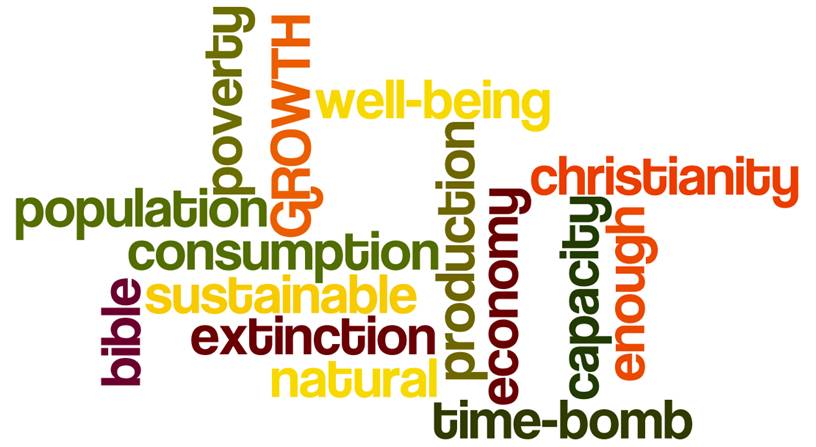Growing pains: Population, Consumption and Economics
Population, Consumption, Economics: three words that are desperately important for our future on planet Earth. They are linked by one problematic word, ‘Growth’: exploding global population, increasing per capita consumption, and political obsession with economic growth. The question for each is the same, ‘How much is enough?’, and it is critical that we look at them together rather than separately.

Some things are beyond dispute. The world’s population grew from c.1 billion to 7 billion between 1800 and 2011. At the same time, the industrial and technological revolutions meant economies and food production grew even faster. Consumption and pollution rates followed and, whilst the link between economic growth, population growth, and consumption is complex, it is obvious that those living in industrialised countries consume and pollute far more per person than those in ‘developing’ countries.
So, can we keep growing our population, consumption and economies? This is where it becomes highly contested! On population, whilst St. Jerome, in the 4th century, stated ‘the world is already full’,[1] other Christians quote Genesis 1:28 (‘be fruitful and increase in number’) as divine encouragement to have big families, and techno-optimists believe an ever-expanding population will drive technology to produce more and more. Others believe population growth is stalling and will start declining globally in the late 21st century, causing severe economic and social problems (fewer young people meaning fewer workers to work, pay taxes, and look after the elderly).[2]
All of this, however, overlooks three things. Firstly, there is a moral problem when citizens in rich nations (whose populations exploded in the 19th and 20th centuries) lecture poorer countries on population growth. In the context of relative consumption levels, this seems suspiciously like guilt-displacement. Evidence shows that the best routes out of rapid population growth are eradicating poverty and educating women.[3]
Secondly, even if population stabilises or declines, whilst current economic and consumption growth rates continue, we are on course for a massive resource crisis. Development organisations need to think hard about the ultimate goal of development. Creating billions more indulgent consumers may not be good for anybody. In 2007 the average global ecological footprint was 2.7 hectares per person whereas the earth’s biocapacity is calculated at around 1.8 hectares per person.[4] ‘This means that humanity has already overshot global biocapacity by 30% and [is] … eroding critical life-support systems.[5] Yet, consumption is very uneven. Those living in some oil-rich states have a per capita ecological footprint 10 times that of the least consuming 20 countries. From an A Rocha perspective, of the 19 countries where we work, 14 have an unsustainable footprint, and only 5 are below 1.8 hectares per person (Ghana, Peru, Uganda, Kenya, India). For Christians, tackling such massive inequality and the impact it has on the poorest, is an issue of justice. Over-consumption is a spiritual issue.
Thirdly, most contemporary discussions on population, consumption and particularly economics share an unspoken assumption that this planet is here for humanity alone, and our sole priority is a safe operating space for human thriving. Christians, though, believe the earth and every creature upon it are God’s. Psalm 104 is one of several biblical passages that portray humans as simply one amongst the many creatures God creates, feeds, delights in, and protects. As I argued in an earlier blog, God’s instruction to ‘fill the earth’ is not about overpopulating the planet but an initial invitation to spread into every habitat. Why? In order to fulfil our calling to bear God’s image in how we care for the earth and all its species.
Growth is natural in plants, platypuses, people and populations. But God’s creation teaches us that growth has its seasons. Cancers, viruses and invasive species are amongst the few things that grow without ceasing. When our obsession with growth, whether in population, resource-use, or economies causes harm not just to our own species but to the ecosystems and planetary systems upon which all life depends, then we are behaving idolatrously.
The subject of ‘Prosperity without Growth’,[6] and whether we can find alternative measures of well-being, needs far more serious attention from economists and others. The Bhutanese model measuring ‘Gross National Happiness’[7] is a great start. Significantly, it is a faith-based approach, within a Buddhist framework. It would be great to see more biblical contribution to this debate too. So, what measurable values can we discern from scripture that would replace GDP with GPT … God’s Plan for Thriving? Over to you …
Endnotes:
[1] Noonan, J. T. Jr., (2012), Contraception: A History of Its Treatment by the Catholic Theologians and Canonists, Harvard University Press, p.83
[2]www.slate.com/articles/technology/future_tense/2013/01/world_population_may_actually_start_declining_not_exploding.html
[4] Footprint statistics from “Ecological Footprint Atlas 2010” www.footprintnetwork.org
[5] Rees, William (2010), “The Human Nature of Unsustainability”, in Heinberg, Richard and Leich,Daniel, The Post Carbon Reader: Managing the 21st Century Sustainability Crisis, Watershed Media, p.199
[6] Tim Jackson, (2009), ‘Prosperity without Growth: Economics for a Finite Planet’, London: Earthscan (available as a PDF at www.gci.org.uk/Documents/Tim_JACKSON_Prosperity_Without_Growth.pdf
[7] www.grossnationalhappiness.com
We are happy for our blogs to be used by third parties on condition that the author is cited and A Rocha International, arocha.org, is credited as the original source. We would be grateful if you could let us know if you have used our material, by emailing [email protected].




Hi Dave, Thank you for this post. Please see this YouTube video, based on the book “Sacred Economics” by Charles Eisenstein. http://www.youtube.com/watch?v=EEZkQv25uEs
The Southern African Faith Communities’ Institute (SAFCEI) is organising an economics conference/event for people of faith in Cape Town in 2014. Eisenstein is going to be one of our key speakers. We’re very excited!
Thanks Sarah. Eisenstein’s economic principles look very interesting to me. The idea of a ‘gift economy’ fits well with the Christian tradition of life itself, and all that we receive through nature, being a gift of God’s grace. I’m not so sure about Eisenstein’s somewhat homespun esoteric philosophical ideas, but there’s certainly plenty of room for agreement and discussion!
Dave, thank you for tackling this difficult subject. Your article is, as always, thought-provoking. I am afraid i am going to be awkward, however, and argue that what is needed is not primarily changes to consumption, measures of social happiness, and family planning, but that these will flow from a change of worldview. Our task as Christians is to change the worldview, not to change the measures.
Population, consumption and economic growth are driven by individual daily decisions, many of which arise out of selfish motives. I would suggest that rather than looking for an appropriate cap to these various forms of growth, our role as Christians is to live out and work for a worldview that replaces the worldview that tells us that we should make our lives as comfortable and pleasant as possible.
In Luke 6:13 we are told “You cannot serve both God and money”. I understand “money” (mammon was the original Aramaic and, as i understand it implies more than mere money) to mean any pursuit of personal happiness as opposed to obedience to God’s commandments. If society as a whole could replace our pursuit of personal happiness with a pursuit of obedience to God, then, by definition, there would be sufficient resources for everyone as well as an appropriate value placed on the other living things with which we share our planet. We cannot, of course, change society as a whole but we can certainly make a difference in our own individual lives and proclaim the message above to those we meet.
Acts 2:45 gives an indication of the ideal society as lived out by the first disciples: “They sold property and possessions to give to anyone who had need.” This is surely the best model of a truly equitable society: the first disciples’ attitude was not for individual, or even collective, “well-being” but to ensure that no-one who was in need was left uncared for. “Think more highly of others than of yourselves.” Economic growth as a measure of societal success ought in the eyes of Christians to be replaced with a measure of society’s conformity to this ideal.
Finally, in considering the question of population growth, it is important to remember that each person is not just a consumer of resources but a unique individual, with a God-given purpose. For prospective parents to make decisions based solely on numerical calculations fails to respect this understanding. In my view it is important for Christian couples to attempt to find God’s will for their particular family with both an understanding of the issues resulting from population growth and a submission to God’s plans.
Thanks Francis. Actually, I completely agree with all you say!! My closing suggestion of using ‘GPT’ (God’s Plan for Thriving) is meant to imply a complete rethink from quantitative to qualitative measures, from growth to relational well-being, from ego-centric individualism to what I like to call Theo-eco-centrism – a worldview centred on God’s heart for all creation (including people of course, but not only thinking of people). In other words: ‘your Kingdom come, your will be done, on earth as in heaven’.
Those who would interpret God’s mandate to humans to be fruitful and increase in numbers as carte blanche for paving over the rest of creation, should bear in mind that God gave the very same mandate to birds and sea creatures, and I quote Genesis 1:22 – “God blessed them and said, ‘Be fruitful and increase in number and fill the water in the seas, and let the birds increase on the earth.’”
Very good point. Next time there’s a planning application for a road / golf course / theme park / shopping centre that destroys important wildlife sites simply to make humans richer or more self-indulgent, perhaps that could form the basis for getting Churches to campaign against it?!
Good thoughts. As an economist, I would say that it is good to think about economic growth, however, this growth should take into account the earth carrying capacity which means that economics should be thought within the context of our larger system: the Earth….God bless you, Paulo Brito
Dear Dave,
Thank you for bringing up the subject of population in the way you have and inviting comments.
“Go forth and multiply” is a blessing, not a command, just as ‘Have a nice day’ is a blessing. A blessing has no penalty for non compliance – we don’t check up on someone to see if they ‘obeyed’ us and had a nice day. Blessings are nice to receive and all species have no difficulty with ‘Be fruitful and multiply,’ whereas commands are often hard to obey. The command in Gen 1:26 to look after all other species is the one we have difficulty obeying.
We know a rule of biblical exegesis is that a passage must be taken in context. The context of “Go forth and multiply” both in Gen 1:28 and in the story of Noah after the Flood (Gen 9:1) is a context of near zero populations. With 7 billion of us, that does not apply to humans today but to so many other species God made and declared ‘good’, whose numbers are declining. So, how can we ensure that these species are looked after? We need to address the population problem by all loving, voluntary means available, to reverse the exponential graph we are on.
Please also see “Conservation through having Smaller Families” on YouTube, Part A MONEY
http://www.youtube.com/watch?v=KUgcw-TxGDA
> “other Christians quote Genesis 1:28 (‘be fruitful and increase in number’) as divine encouragement to have big families”
They do – and I have responded in detail to the use of such Bible verses by pronatalists in chapter 4, which is freely available online:
http://katav.co.uk/chapters-christian-reproduction/
Yes. In a document I have just delivered to my own church, I have used this verse to make the point that God desires his creation not simply to exist, but to be abundant. “20 thousand of a species? why not 100 thousand?” is a completely different mindset to “we humans can use up this land over here, because there’s another just like it right over there”.
Thank you, John McKeown, for this link to your writing and for your manifest ecological concern that has motivated it. I’ve read the first chapter, look forward to reading further and am glad a Christian writing on population of this high calibre exists.
You may have already covered the following in chapters I have not yet read, but in English, verbs belong to one of three ‘moods.’ They are the Indicative mood e.g. “It’s a nice day,” the Interrogative mood e.g. “Will tomorrow be a nice day?” and the Imperative mood, used for commands and blessings. While we cannot command that tomorrow will be a nice day, we can give someone a blessing and say, “Have a nice day.”
There is only one ‘mood’ available for blessings, since neither the indicative nor the imperative mood is suitable. It is the imperative mood – but that does not make a blessing into a command. The two are very different. “Go forth and multiply” is stated to be a blessing.
> God gave the very same mandate to birds and sea creatures … not simply to exist, but to be abundant.
Yes that’s a good point: problem isn’t just the extreme cases of extinction, but loss of abundance and genetic diversity of many species. I wonder what number is needed to be comfortable in genetic diversity?
But there must be diminishing returns to increasing number e.g. 10,000 gorillas (or whatever) safe enough, and 20,000 not much safer. Since the blessing is for all species, and each impinges on others, I imagine an ideal is for all species to be numerically secure. If one or a few species are over-abundant that is disorderly (as some Bible texts about locusts and frogs recognize).
Thank you Nola. Yes “be fruitful” is a blessing – but some biblical scholars consider it also a command. And even if it were possible to gain consensus that it isn’t a command, I doubt that would impede natalist preachers. They major on blessing.
Dave Bookless accurately observes that some Christians [I call them natalists] quote “be fruitful and increase” as divine *encouragement* to bear many children. My observation is similar: the central pillar of natalist teaching is that children are blessings – the more the better. OK a few extreme writers stress *command* but from surveying natalists I find that’s used less frequently than *blessing*.
Pages 118-122 may be helpful.
http://research-archive.liv.ac.uk/11333/